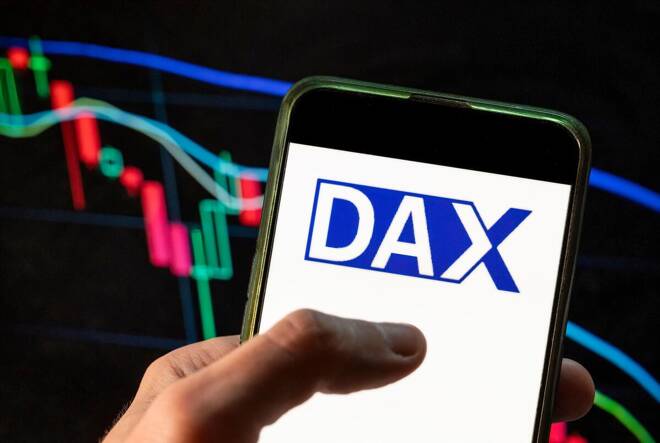Advertisement
Advertisement
Dax Index News: Manufacturing PMI in Focus as DAX Eyes 19,500 Resistance
By:
Key Points:
- DAX rallies 0.93% on expectations for a December Fed rate cut after the US Jobs Report.
- German Manufacturing PMI expected to rise from 40.6 to 42.6, potentially supporting DAX stocks.
- The threat of Trump tariffs on Euro area goods remains a DAX headwind as the polls signal a tight election
DAX Rallies on Fed Rate Cut Bets
On Friday, November 1, the DAX climbed 0.93%, reversing a 0.93% loss from the previous session, to close at 19,255. Rising bets on a December Fed rate cut fueled demand for riskier assets, boosting DAX-listed stocks.
Major Stock Movers: Capital Intensive Stocks Lead the Way
Siemens Energy AG and Siemens AG were among the best performers, rallying 2.08% and 1.75% on expectations for a December Fed rate cut. Capital-intensive firms typically benefit from dovish ECB and Fed rate paths. MTU Aero and Airbus advanced by 1.80% and 1.11%, respectively.
Auto stocks experienced a mixed session amid growing concerns over weakening demand from China. Volkswagen and Daimler Truck Holding saw losses of 0.49% and 1.32%, respectively, while BMW advanced by 1.16%.
China Manufacturing Sector Returns to Expansion
On Friday, the Caixin Manufacturing PMI increased from 49.3 in September to 50.3 in October, returning to expansion. The better-than-expected numbers raised hopes of a pickup in China’s economy, potentially improving the demand environment.
The PMI figures set the tone for the Friday European session, with the DAX advancing from the opening bell.
German Manufacturing in Focus
Looking ahead to Monday, November 4, Germany’s finalized HCOB Manufacturing PMI will require consideration. According to the preliminary report, the PMI increased from 40.6 in September to 42.6 in October. An upward revision to the headline PMI and softer price trends may support demand for DAX-listed stocks.
Softer prices may raise bets on a 50-basis point ECB rate cut, potentially driving the DAX through 19,350.
US Jobs Report Boosts Bets on December Fed Rate Cut
On Friday, the US Jobs Report raised investor expectations for a December Fed rate cut. Notably, nonfarm payrolls increased by just 12k in October, down from 223k in September, while the US unemployment rate held steady at 4.1%.
A softer labor market may ease wage growth, dampening consumer spending and inflationary pressures.
According to the CME FedWatch Tool, the chances of a 25-basis point December Fed rate cut jumped from 71.1% on October 31 to 82.7% on November 1. Growing bets on a December Fed rate cut fueled demand for riskier assets.
US Equity Market Overview
On Friday, November 1, US equity markets started the month with solid gains. The Nasdaq Composite Index and the Dow advanced by 0.69% and 0.80%, respectively, while the S&P 500 gained 0.41%.
Atlassian Corp. (TEAM) surged by 18.99% on better-than-expected earnings, contributing to the Nasdaq’s gains.
US Factory Orders in Focus After US Jobs Report
In Monday’s US session, factory orders will draw investor interest. Economists forecast factory orders to decline by 0.4% in September after falling 0.2% in August.
A larger-than-expected decline may signal weak demand, raising bets on a December Fed rate cut. However, an unexpected increase in orders could temper expectations for a December Fed rate cut, potentially dragging the DAX below 19,000.
Near-Term Outlook
In the near term, DAX trends will depend on private sector PMIs, the US Presidential Election, and the Fed’s interest rate decision. Weaker private sector PMIs, a Trump victory, and a less dovish-than-expected Fed could pull the DAX toward 18,750.
Markets expect Trump to introduce fresh tariffs, potentially impacting demand for Euro area goods and services.
Conversely, improving private sector activity, a Kamala Harris win, and rising bets on a December Fed rate cut may push the DAX through 19,350.
Futures indicate a positive start to the Monday session. DAX futures and Nasdaq mini futures were up by 3 points and 68 points, respectively.
Investors should stay alert, with the US Presidential Election, the Fed, and crucial economic data in focus. Stay informed with our latest news and analysis to manage your risks effectively.
DAX Technical Indicators
Daily Chart
The DAX remains above the 50-day and 200-day EMAs, confirming bullish price trends. However, a significant drop below these levels could shift sentiment to bearish.
A return to 19,350 could signal a move toward 19,500. Furthermore, a break above 19,500 may allow the bulls to target the all-time high of 19,675.
Investors should consider today’s economic indicators, the US Presidential Election polls, and central bank chatter, which will likely affect market sentiment.
Conversely, a DAX drop below the 50-day EMA and 19,000 could indicate a fall toward the 18,750 level.
The 14-day RSI at 49.93 indicates a potential fall to 18,750 before entering oversold territory.
About the Author
Bob Masonauthor
With over 28 years of experience in the financial industry, Bob has worked with various global rating agencies and multinational banks. Currently he is covering currencies, commodities, alternative asset classes and global equities, focusing mostly on European and Asian markets.
Advertisement
